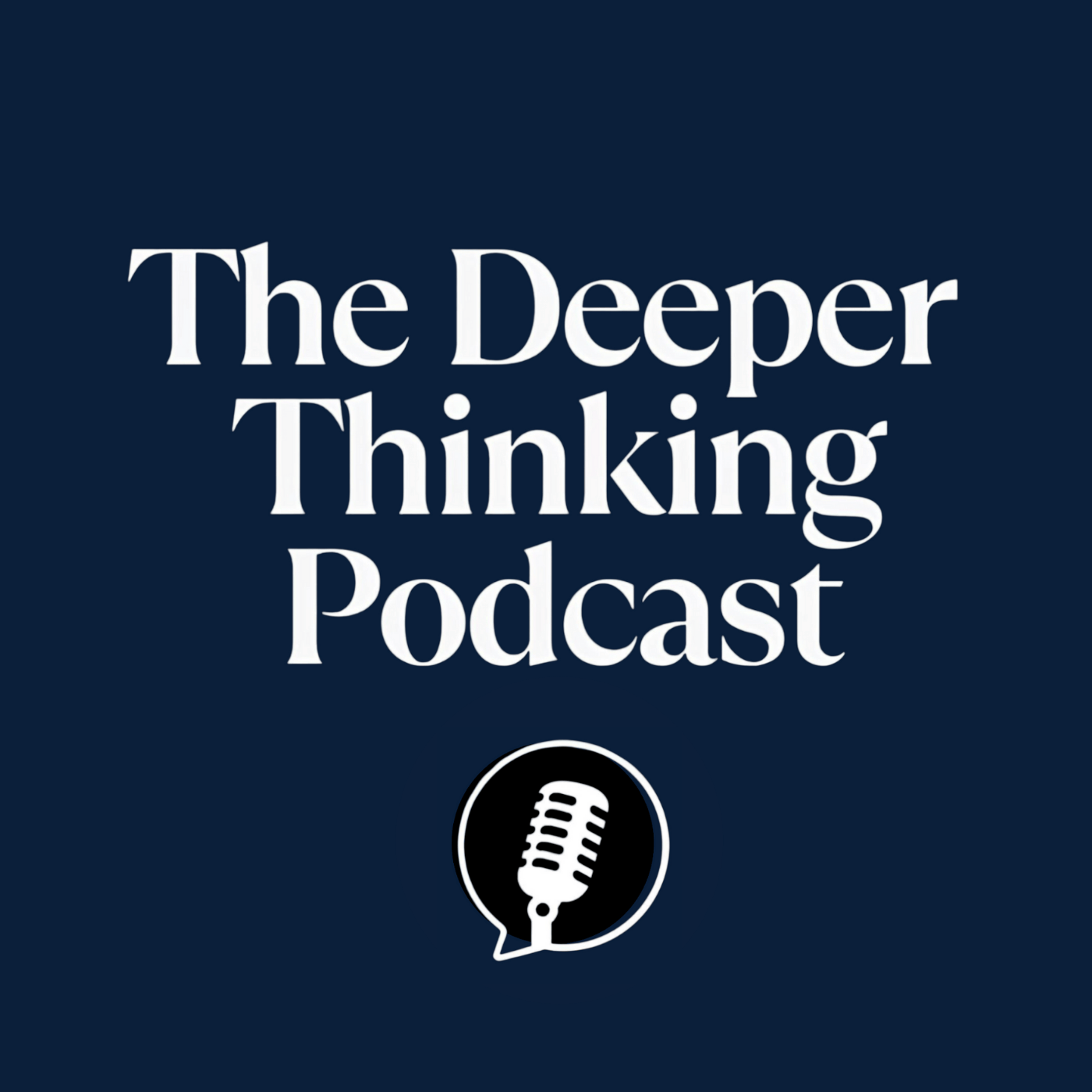Listen "The Final Phase: Capitalism’s Shift from Expansion to Exclusion"
Episode Synopsis
The Final Phase: Capitalism’s Shift from Expansion to Exclusion
The Deeper Thinking Podcast
For those tracing the quiet collapse of growth—and the rise of economic control.
For centuries, capitalism has evaded collapse—not by solving its crises, but by shifting form. From industrial labor to financialization, from markets to metadata, it has always found new terrain to extract from. But what happens when the system runs out of space to grow? When adaptation gives way to entrenchment—and expansion becomes exclusion?
This episode explores capitalism’s transformation into a system of control. Drawing on economic critique, climate realities, and emerging post-work theory, we examine how capitalism is becoming less about productivity—and more about containment. As automation displaces labor and climate destabilizes economies, power is shifting toward those who own not factories, but the conditions of survival: water, land, energy, and data.
We are no longer watching capitalism evolve. We are watching it solidify into an architecture of exclusion—defined not by opportunity, but by access. This is no longer a system that lifts. It sorts, encloses, and controls. The question is no longer: how do we thrive within it? But: what comes after?
Reflections
This episode invites listeners to see past the illusion of continuous growth. It’s a reflection on what capitalism becomes when growth is no longer possible—and what that means for our future.
Here are some reflections that surfaced along the way:
Capitalism has always needed a frontier. Without one, it turns inward—on us.
When productivity declines, surveillance rises.
Owning the means of production is no longer enough. Power now lies in owning the means of survival.
Automation is not replacing labor. It is replacing participation.
In the absence of work, we are told consumption is enough.
Late capitalism doesn’t collapse. It calcifies.
When crisis becomes the economy, survival becomes a product.
Freedom under capitalism is the freedom to consume—or be excluded.
To imagine alternatives, we must first stop believing this is the only system that can exist.
Why Listen?
Examine capitalism’s shift from productivity to resource control
Understand the rise of surveillance capitalism and the monetization of data
Explore how automation and AI are displacing labor at structural levels
Interrogate neoliberalism’s limits and why exclusion—not adaptation—is its final form
Reflect on how climate change is reshaping global markets, migration, and inequality
Listen On:
YouTube
Spotify
Apple Podcasts
Bibliography
Klein, Naomi. The Shock Doctrine. New York: Picador, 2008.
Fisher, Mark. Capitalist Realism. Winchester: Zero Books, 2009.
Zuboff, Shoshana. The Age of Surveillance Capitalism. New York: PublicAffairs, 2019.
Bibliography Relevance
Naomi Klein: Explains how capitalism uses crisis as opportunity for consolidation and control.
Mark Fisher: Unpacks why capitalism feels inescapable—even in the face of systemic failure.
Shoshana Zuboff: Illuminates how surveillance and data extraction have become capitalism’s core logic.
Capitalism was built on expansion. Now that expansion is no longer possible, what comes next?
#LateCapitalism #SurveillanceCapitalism #MarkFisher #NaomiKlein #ShoshanaZuboff #ClimateCollapse #Automation #Neoliberalism #DeeperThinkingPodcast #PostWorkEconomy #EconomicExclusion #SystemicInequality
The Deeper Thinking Podcast
For those tracing the quiet collapse of growth—and the rise of economic control.
For centuries, capitalism has evaded collapse—not by solving its crises, but by shifting form. From industrial labor to financialization, from markets to metadata, it has always found new terrain to extract from. But what happens when the system runs out of space to grow? When adaptation gives way to entrenchment—and expansion becomes exclusion?
This episode explores capitalism’s transformation into a system of control. Drawing on economic critique, climate realities, and emerging post-work theory, we examine how capitalism is becoming less about productivity—and more about containment. As automation displaces labor and climate destabilizes economies, power is shifting toward those who own not factories, but the conditions of survival: water, land, energy, and data.
We are no longer watching capitalism evolve. We are watching it solidify into an architecture of exclusion—defined not by opportunity, but by access. This is no longer a system that lifts. It sorts, encloses, and controls. The question is no longer: how do we thrive within it? But: what comes after?
Reflections
This episode invites listeners to see past the illusion of continuous growth. It’s a reflection on what capitalism becomes when growth is no longer possible—and what that means for our future.
Here are some reflections that surfaced along the way:
Capitalism has always needed a frontier. Without one, it turns inward—on us.
When productivity declines, surveillance rises.
Owning the means of production is no longer enough. Power now lies in owning the means of survival.
Automation is not replacing labor. It is replacing participation.
In the absence of work, we are told consumption is enough.
Late capitalism doesn’t collapse. It calcifies.
When crisis becomes the economy, survival becomes a product.
Freedom under capitalism is the freedom to consume—or be excluded.
To imagine alternatives, we must first stop believing this is the only system that can exist.
Why Listen?
Examine capitalism’s shift from productivity to resource control
Understand the rise of surveillance capitalism and the monetization of data
Explore how automation and AI are displacing labor at structural levels
Interrogate neoliberalism’s limits and why exclusion—not adaptation—is its final form
Reflect on how climate change is reshaping global markets, migration, and inequality
Listen On:
YouTube
Spotify
Apple Podcasts
Bibliography
Klein, Naomi. The Shock Doctrine. New York: Picador, 2008.
Fisher, Mark. Capitalist Realism. Winchester: Zero Books, 2009.
Zuboff, Shoshana. The Age of Surveillance Capitalism. New York: PublicAffairs, 2019.
Bibliography Relevance
Naomi Klein: Explains how capitalism uses crisis as opportunity for consolidation and control.
Mark Fisher: Unpacks why capitalism feels inescapable—even in the face of systemic failure.
Shoshana Zuboff: Illuminates how surveillance and data extraction have become capitalism’s core logic.
Capitalism was built on expansion. Now that expansion is no longer possible, what comes next?
#LateCapitalism #SurveillanceCapitalism #MarkFisher #NaomiKlein #ShoshanaZuboff #ClimateCollapse #Automation #Neoliberalism #DeeperThinkingPodcast #PostWorkEconomy #EconomicExclusion #SystemicInequality
 ZARZA We are Zarza, the prestigious firm behind major projects in information technology.
ZARZA We are Zarza, the prestigious firm behind major projects in information technology.
